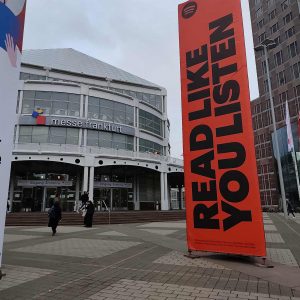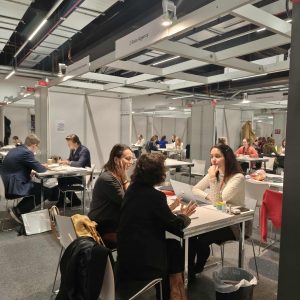
03 Nov An Energetic and Optimistic 2025 Frankfurt Book Fair
By Marleen Seegers and Chrysothemis Armefti — Article first published on November 3rd, 2025
The 77th edition of the Frankfurt Book Fair, held from October 14 to 18, 2025, marked another year of success. It welcomed 238,000 visitors from 131 countries and over 4,350 exhibitors. Both the Literary Agents & Scouts Centre and Publishers Rights Centre were fully booked, highlighting a strong interest in international rights. The book fair reaffirmed its dual position as the world’s leading hub for publishing professionals and a lively literary festival for all generations during the fair’s public days (from Friday to Sunday).
Despite the various challenges facing the publishing industry, including cost inflation, strained translation markets, and slower rights returns in some territories, editors were very optimistic during our meetings and eager to hear about the titles we were pitching. This seems to be an overall feeling, as noted in this Bookseller article “Publishers ‘optimistic’ following Frankfurt Book Fair 2025 despite challenges” which qualifies the fair as “productive and buzzy.”
 Importance of Relationships
Importance of Relationships
Meeting with publishers in person is more necessary and relevant than ever. Editors receive hundreds of rights catalogs, submissions, and newsletters from rights sellers in the weeks leading up to the Frankfurt Book Fair, making it extremely challenging for them to review all the material. Some editors are fortunate enough to have literary scouts who act as an initial filter, helping them prioritize and providing them with reading reports, but this is not the case for everyone. Our role as rights sellers, when preparing our meetings, is to be ready with a tailored selection of titles for each of the individual editors, co-agents, and scouts we are meeting.
As we’ve mentioned from the start of the agency, making books travel relies heavily on relationships. Even though alternative ways of meeting continue to evolve (such as pre-fair video calls and hybrid events), the in-person aspect remains central.
Steady, but Less Frantic Bidding

Even during the fair, not many books were preempted—except for “our book of the fair,” Dutch literary debut Bullhead by Manik Sarkar (Hollands Diep), of which Pushkin Press acquired the world English rights at auction while Marleen was in New York. As Chrys and Marleen were in meetings at the Frankfurter Hof on Monday, the day before the fair started, Grasset preempted the French rights (after Chrys discussed it at length with them when she was in Paris in September), followed by an Italian preempt from La Nave di Teseo two days later. Alfaguara has just acquired the Spanish rights; the German rights were preempted after last year’s Frankfurt Book Fair by Paul Zsolnay.
Most deals, however, followed in the days and weeks after the fair, giving the deal-making a less frantic and more harmonious aspect.
 Trends
Trends
We noticed that serious nonfiction continues to be relevant, reflecting the turbulent global mood. Nonfiction publishers are seeking popular and accessible titles in history, science, psychology, politics, and society, helping readers gain a deeper understanding of the world we live in. Given the global turmoil and polarization, books about mental health, spirituality and mindfulness continue to be in high demand.
However, similar to the feedback Marleen received during her recent visit to New York, nonfiction editors insisted that, exceptions aside, they’re interested in acquiring a book in translation only if one of their local authors would not be able to write this kind of book. A shared cultural and historical background tied to a local (social) media presence provide the ideal scenario.
Chrys noticed an emerging trend in several European countries of cozy bold-simple coloring books for adults and teens, thanks to BookTok. Originally a children’s hobby, coloring for adults started gaining popularity in 2015.
In terms of fiction, escapist fiction (romance, romantasy, romantic comedies, feel-good novels, cozy crime, and, in a more cathartic way, horror) remains strong. Interest in dark romance and spicy romance continues to grow, and publishers are still looking for exceptional literary titles with a compelling narrative arc.

AI Is Here to Stay
Meanwhile, the impact of artificial intelligence on the industry is another significant issue that publishers and agents are facing. With the rise of digital-only deals (mostly in Northern Europe) and fast-paced production demands, publishers are increasingly embracing AI tools to translate books. In the commercial fiction sphere, a small but growing number of Dutch and Nordic editors are making offers contingent on the use of an AI-assisted translation tool to create the initial draft, which will then undergo multiple reviews by editors specialized in the genre. While this seemed to be a dealbreaker a few years ago, it has become a more frequent topic in our discussions and those of the industry overall, including the use of AI for audio narration.
Looking Ahead
We left Frankfurt feeling optimistic about the months ahead. The fair’s energy, as well as the deals that continue to arrive in our inboxes following our meetings, suggest that, despite publishers navigating a more challenging market amidst global political and economic turmoil, they remain resilient and adaptable. The power of storytelling and its ability to connect people from different backgrounds and cultures remain at the core of the human experience.

 2 Seas Agency returned to the Frankfurt Book Fair, celebrating a milestone moment with Marleen’s 19th (20th, if
2 Seas Agency returned to the Frankfurt Book Fair, celebrating a milestone moment with Marleen’s 19th (20th, if  Importance of Relationships
Importance of Relationships

Sorry, the comment form is closed at this time.